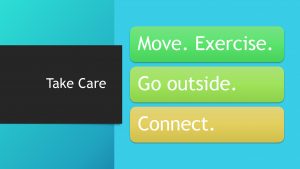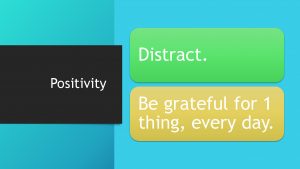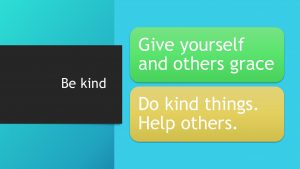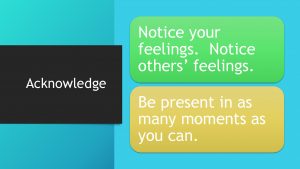During times of struggle, we question whether wellbeing or joy or happiness is important – right now, wellbeing is even more important so we can stay healthy, be resilient in times of change, and help our struggles feel manageable. How do we build this resilience, while being compassionate? Heather Quackenboss, Human Development and Relationships Educator at Extension tells us how we can do this:
One of the first steps to be resilient and be compassionate with ourselves is to acknowledge feelings. Often, we will try to stuff or ignore our feelings, and what happens when we do that is they fester and they get bigger and they’ll explode. And when we are in closer quarters, when we are living a new normal, and we do not take care of those feelings and they explode, things can happen or are said that we might regret. When we acknowledge and notice our feelings, or the feelings of others, we are saying I see you, I hear you, and I will sit here with you. This helps us figure out what we need, it helps teach emotional regulation, and it helps us be okay even when we are not feeling okay.
Another thing to build resilience and be compassionate is to be present in the moment. Noticing what is around us is one step toward this mindfulness. If you are taking a walk, what do you notice? What do you see? What are the smells? What do you hear?
To  build resilience, and be more compassionate with ourselves, we need to move, or exercise, get outdoors, and connect. Often times, we are not going to want to move or exercise when we are feeling low. It is paradoxical – We don’t want to do it and as soon as we are moving and when we are finished, our mood has likely improved. Find one thing that you are willing to do to move, and schedule it in your day. Make it easier for yourself to do.
build resilience, and be more compassionate with ourselves, we need to move, or exercise, get outdoors, and connect. Often times, we are not going to want to move or exercise when we are feeling low. It is paradoxical – We don’t want to do it and as soon as we are moving and when we are finished, our mood has likely improved. Find one thing that you are willing to do to move, and schedule it in your day. Make it easier for yourself to do.
If that exercise or movement is outdoors, it is even better! Being outside in nature improves our wellbeing greatly! Fresh air, budding trees, warmer air, singing birds, talking a walk or even just sitting outside for 10 minutes will help us feel better.
Finally, to build resilience and to take care of ourselves, we need to connect. We are social. And we have been asked to limit our in person social contact. We can learn so much from our younger generations on how to connect through all kinds of social media platforms. And we can learn from our older generations by placing that phone call or writing a letter. Connecting to our friends and loved ones is vitally important. As we distance ourselves physically, it can be easy to isolate – and isolation is detrimental to our health. Reaching out to one person a day through a text, or message, or phone call, will assist us in our social and emotional health and is such a gift.
 Another way to build resilience is to find positivity. To have an optimistic outlook on different things – not to ignore what’s going on, nor sugarcoat reality – looking at what is happening as a challenge or opportunity. When we look at things in a positive light, we can look at things with hope. How do we do that? First, distraction helps – playing music, reading a book, making some crafts or art, activities that we love, help our brains remain positive and optimistic.
Another way to build resilience is to find positivity. To have an optimistic outlook on different things – not to ignore what’s going on, nor sugarcoat reality – looking at what is happening as a challenge or opportunity. When we look at things in a positive light, we can look at things with hope. How do we do that? First, distraction helps – playing music, reading a book, making some crafts or art, activities that we love, help our brains remain positive and optimistic.
Another way to help our brains learn how to see the positive is to find one thing we are grateful for every day. When we find something that we are grateful for, it helps our brain learn how to find positivity, no matter what that day is like. Gratitude improves the neuroplasticity in our brain and helps us learn to go against our natural negativity bias. Being grateful for tiny things in small moments and noticing them improves our resilience and compassion.
 Compassionate resilience is also built by being kind, by giving ourselves grace, by giving others grace, or forgiveness. We are all human, we make mistakes, and acknowledging those mistakes and being able to move on helps us during challenging times and greatly helps our wellbeing and keeps us resilient and strong.
Compassionate resilience is also built by being kind, by giving ourselves grace, by giving others grace, or forgiveness. We are all human, we make mistakes, and acknowledging those mistakes and being able to move on helps us during challenging times and greatly helps our wellbeing and keeps us resilient and strong.
The other way to build this resilience and be compassionate, is to do things for others – to help other people. Studies have shown that helping others can greatly improve our wellbeing. And while we might have to be creative during these times to help others, that help is going to be so appreciated and will help us build our resilience and be more compassionate with ourselves.
Wellbeing is very important during times of struggle and challenge. We can build resilience. We can build it compassionately. And that is how we stay well during struggle and during times of challenge.
Compassionate Resilience
In tough times, we might question if being happy or positive is important. Learn from Heather Quackenboss, Human Development and Relationships Educator at UW Madison Division of Extension in La Crosse County, how our wellbeing is even more important during these challenging times and how to build our resilience, compassionately. Here is a great video on Compassionate Resilience:




